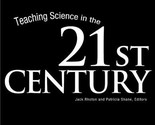Teaching Science in the 21st Century: Teaching Science in the Twenty-First Centu
Don't miss out on this item!
There is only 1 left in stock.
Shipping options
Seller handling time is 2 business days Details
This reflects the seller's handling time and may not include time spent in transit.
If you have questions about shipping, please contact the seller.
$3.99 via to United States
Return policy
Full refund available within 30 days
Payment options
PayPal accepted
PayPal Credit accepted
Venmo accepted
PayPal, MasterCard, Visa, Discover, and American Express accepted
Maestro accepted
Amazon Pay accepted
Nuvei accepted
Shipping options
Seller handling time is 2 business days Details
This reflects the seller's handling time and may not include time spent in transit.
If you have questions about shipping, please contact the seller.
$3.99 via to United States
Return policy
Full refund available within 30 days
Payment options
PayPal accepted
PayPal Credit accepted
Venmo accepted
PayPal, MasterCard, Visa, Discover, and American Express accepted
Maestro accepted
Amazon Pay accepted
Nuvei accepted
Item traits
| Category: |
Books & Magazines
|
| Quantity Available: |
Only one in stock, order soon
|
| Condition: |
New
|
| ASIN: |
B01FGNDIGI
|
| manufacturer: |
National Science Teachers Association
|
| Publication Date: |
1869-01-01
|
| binding: |
paperback
|
| format: |
paperback
|
| Item Name: |
View details
Teaching Science in the 21st Century: Teaching Science in the Twenty-First Century by Jack Rhoton (2006-01-30)
|
| Subject Keyword: |
'non-fiction', 'education'
|
| Generic Keyword: |
teaching
|
| author: |
Jack Rhoton
|
| Product Site Launch Date: |
2016-08-08T01:54:22.850Z
|
| Product Description: |
View details
This powerful new book is brain food for all those who care deeply about science and students—including teachers, science educators, curriculum specialists, and policy makers. The collection of 21 provocative essays gives you a fresh look at today...
|
Listing details
|
Seller policies:
|
View seller policies
|
|
Shipping discount:
|
No combined shipping offered
|
|
Posted for sale:
|
More than a week ago
|
|
Item number:
|
683909547
|
Additional Details
------------------------------
Product description: This powerful new book is brain food for all those who care deeply about science and students?including teachers, science educators, curriculum specialists, and policy makers. The collection of 21 provocative essays gives you a fresh look at today?s most pressing public policy concerns in science education, from how students learn science to building science partnerships to the ramifications of the No Child Left Behind legislation. The editors capture the latest research, trends, and best practices that science teachers and science leaders can use, organized around five 1. Science of Learning Science explores up-to-date thinking on the methods, procedures, and reasoning processes students use to accumulate knowledge of the natural world.2. Leadership in Science Teaching and Learning addresses the bold leadership necessary to bring about substantive change in science programs in today?s complex educational systems that must occur at all levels.3. Professional Implications for Science Teaching and Learning examines research on the effectiveness of high-stakes accountability systems in bringing about improvements in professional development and student learning.4. Within the Science Classroom looks at the impact of technology, the importance of a standards-based curriculum, assessment of science instruction and student learning, and planning science experiences for diverse student populations.5. Building Science Partnerships and Collaboration considers the importance of partnerships in science education reform, the impact of No Child Left Behind, and the role of professional learning communities in strengthening the science program. Teaching Science in the 21st Century is the latest joint publication of NSTA and the National Science Education Leadership Association. It provides a blueprint for developing a culture that allows and encourages science leaders to continually improve science programs.
